|
|
|
||
| home | table of contents |feature | record reviews | live shows | news | events |archive | record label | links | contact | ||
|
"Black
Bag"
We’ve gone through a lot of line-ups. The whole thing got started, I mentioned before (see the beginning of Kid’s discussion of Khan), that we started as a kind of “panic” band. “Panic” because there wasn’t a band to play and I had to make something. But that went through a lot of changes and we had kid of a long tenure with one band which had Paul Wallfisch and Siobhan Duffy in it - and me and Jack and Jerome - and that was kind of the starting of the band. I’m kind of the thought that I’m willing to wait. I’ve learned this from Congo Norvell too – that you’ve got to wait and see what happens. And I like a band that will have its own sound and its own voice and it takes time for that to happen. That’s the only kind of bad thing about having a kind of known past is that people don’t give you give you that leeway to let stuff happen. You have to instantly have the answer right there in your hand. And I think especially if you want to have a band that's music isn’t that cut and dry. You can’t just pull it out of a hat. And I know that from people - people didn’t pull it out of a hat. They worked very hard at it and had to give it time to become its own beast.
We played out really a lot and it took a while to come up with what it was going to become and it went through a lot of changes. And I had to decide from a songwriting sort of way which way things were going to go. It started to take shape in a more kind of almost 1970s glam sort of way. And I started to think, “What do I really want? And what do I have to really draw upon?” And what I decided to do was to go back to what I was listening to before I was a band person before I was a musician. You know, “What did I really grow up with?” And what I really grew up with was David Bowie’s Ziggy Stardust, Aladdin Sane, all of those Lou Reed solo albums, some Leonard Cohen, and I really loved soul music always – just draw upon different things. And then I also decided that finally I could also draw upon myself. That was kind of one of the big things that I thought, “Somehow I’ve done so many completely different things. There must be a way to harness this all together into one thing and find some of my favorite elements of the different bands I was in and put it into one band" - and that’s what Kid Congo and the Pink Monkey Birds are today. In
the Kid Congo and the Pink Monkey Birds of today the band is not
made up of people I’ve worked with in the past. And they’re
not people who have been in a lot of bands that were popular. And
also on our recording I wanted to work with totally new everything.
I could have asked Mick Harvey to produce it. I could have asked
Victor Van Vugt to record it. I could have asked any one of a million
people to play on it and they all would have said “yes”
and done it. And that wasn’t what I wanted to do. I wanted
to make a whole other sound with a whole other group of people.
Sometimes playing with people who are just good players and good
chemistry has always worked before. And it doesn’t matter
if they were famous or not or if they’re sort of super-prolific
or accomplished. A band is creating your own world and starting
to enjoy creating a world with these people. The Incomperable Jack Martin
The title of the album, Philosophy and Underwear, is actually taken from one of the songs, “Even Though Your Leather is Cliché,” which is a New York story about S&M. I was thinking about the Sally Can’t Dance album especially in that song. It’s really a kind of song about “who is this person?” and why they’re interested in this kind of debauchery - but they feel really foolish about it as well. And it’s also a kind of thing that says, “OK, you’re kinky and so, right on!” And leather can be about rockers who wear leather or rebel stance. And that’s right on for me. And you see punk rockers in leather. It’s all about costume. It’s all drag. But they’re all trying to say something. And that’s why S&M – sometimes it gets kind of witchy and dark and dungeons and dragon-y. And so to me S&M is all about "philosophy and underwear" - if you want to boil it down. And when I thought of that, I thought it was so hysterical. And so that song is set in New York – a little story about someone having second thoughts about what they got into. There’re some songs on there that we’ve been playing live since our inception. Like I said, I started compiling all of these solo songs and, when I had to do a solo gig, I said, “Well these are songs I wrote that I did in other forms.” And they actually got reworked to the point where they’re unrecognizable from their original versions. So I included them on this record because they completely changed from their original ways. “La Historia de Un Amour” was the thing I did a million years ago with Robin on the solo EP. And also that they had relevance now - that was a song I wrote in the post-Reagan era when I was really upset about that – although its really just a story about a drag queen. That really was about the times and about dissatisfaction with people – looking around and seeing what’s going on. “The Last Word” was a song that had written originally for me to sing on the album with Congo Norvell but Sally sang it so much better that I had to have her sing it. But I had other ideas and also it fit into the theme of what was going on. “Why Hurt Flesh” I had done with Khan. We actually made a real rock version of that and then we took the rock version and we manipulated it back into an electronic version. Actually Khan’s version is far more rock than our version. So that was just perverse experimentation.
Actually
I did get Khan on the record – with Captain Comatose, with
Khan and my friend Snax. In those Seventies records they always
had Thunder Thighs and those background singers – like the
black lady singers. So I got Khan and Snax to be my Thunder Thighs.
And I think these are people who like fucking with what’s
supposed to be right. A lot of people are purists – especially
about music – and very precious about it. And we’re
just brats that want to mess things up for them. We want to say,
“No, the electronic disco band can play on the dirty rock
record and the dirty rock guitar player can play on the disco record.”
No one said anything when Slash played on Michael Jackson’s
record. Did they? Solo Cholo and Beyond
Plans for 2006 are an American tour for Kid Congo and the Pink Monkey Birds to promote the Philosophy and Underwear album and then the release of Solo Cholo and then a tour for that. So I’ll have my work cut out for me. Not that I haven’t – judging from this interview from the past thirty years.
Kid
Congo Powers Pt 2 home page | Kid
Congo Powers Oral History table of contents
© New York Night Train , 2005
|
||
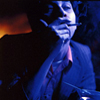
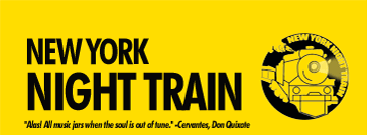
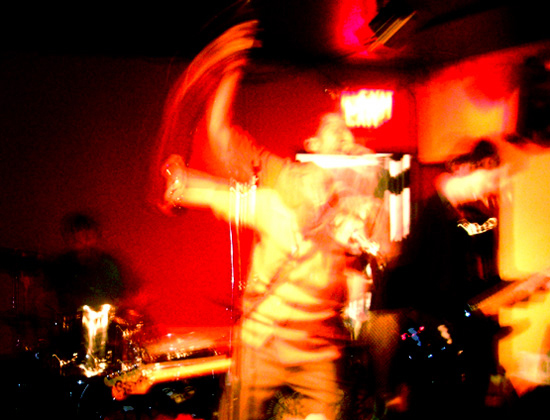
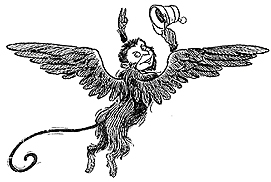 Currently,
the latest project for Kid Congo Powers is Kid Congo and the Pink
Monkey Birds. That’s my band that I have with Jack Martin,
longtime collaborator. And also Jerome O’Brien has been playing
with us. And we’ve actually been going for about four years
if you count all of the false starts we’ve had.
Currently,
the latest project for Kid Congo Powers is Kid Congo and the Pink
Monkey Birds. That’s my band that I have with Jack Martin,
longtime collaborator. And also Jerome O’Brien has been playing
with us. And we’ve actually been going for about four years
if you count all of the false starts we’ve had. 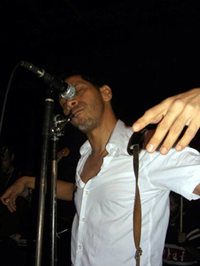 And
I chose to become the singer of this band and the main songwriter
with Jack. And I knew I had to learn. I’d been getting a lot
more practice being a front-person with Khan on these tours and
it was kind of an appealing new thing for me too. And so I was willing
to see what would happen with the band and where it would go and
when it would develop its own kind of sound with the people and
let them grow and do stuff. After a while Siobhan decided not to
play drums and pursue other things in her life and Paul got busy
with Botanica. We had to get some new people. And the new people
we got: Josh Belknap and Barry London, from Knoxville Girls, played
with us for a while. That changed the sound once again. It became
much more rock-y and then I had to adapt myself to that too because
that was different from the other band that was a little more singer-ish.
And then it got rockier so I had to find my way into that because
I’m not really a rock singer. I’m not a shouter. I’m
not a howler. I’m a talker.
And
I chose to become the singer of this band and the main songwriter
with Jack. And I knew I had to learn. I’d been getting a lot
more practice being a front-person with Khan on these tours and
it was kind of an appealing new thing for me too. And so I was willing
to see what would happen with the band and where it would go and
when it would develop its own kind of sound with the people and
let them grow and do stuff. After a while Siobhan decided not to
play drums and pursue other things in her life and Paul got busy
with Botanica. We had to get some new people. And the new people
we got: Josh Belknap and Barry London, from Knoxville Girls, played
with us for a while. That changed the sound once again. It became
much more rock-y and then I had to adapt myself to that too because
that was different from the other band that was a little more singer-ish.
And then it got rockier so I had to find my way into that because
I’m not really a rock singer. I’m not a shouter. I’m
not a howler. I’m a talker. 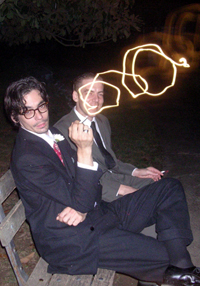 My
main songwriting collaborator in The Pink Monkey Birds is
My
main songwriting collaborator in The Pink Monkey Birds is 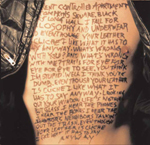 So
finally, a million years later, we decided to record an album. We
thought the time has come. Again, like I said, we did it self-financed,
on our own. That was a conscious effort and really what I wanted
to do. And I wanted it to be a really raw record that represented
what we are like live. It’s practically a live album. I didn’t
want it to be super-frilly. But I wanted to make a funny but serious
album. Does that make sense? I wanted to make an album that was
like a 1970s album – like what I found interesting about music
when I first got interested in music - and that would be some rawness
- and that would be some smart lyrics - but that made you laugh
- and some interesting topics. It’s a very sleazy record.
That’s kind of what we are and what we came out of –
a sleazy atmosphere. And that’s what our life experience has
been. And still I’m looking at the underbelly of what’s
going on and the subconscious of what’s going on. It’s
really about New York of a different time. Almost all of the songs
are about that and are all very narrative and all contain characters.
And musically we’ve added electronics into the band. Like
I said, I wanted to bring everything I had into the band. And I
wanted to make a garage rock record that was smarter than a garage
rock record and wanted to make a thinking man’s garage rock
record. I don’t know if garage rockers want to think but they
should.
So
finally, a million years later, we decided to record an album. We
thought the time has come. Again, like I said, we did it self-financed,
on our own. That was a conscious effort and really what I wanted
to do. And I wanted it to be a really raw record that represented
what we are like live. It’s practically a live album. I didn’t
want it to be super-frilly. But I wanted to make a funny but serious
album. Does that make sense? I wanted to make an album that was
like a 1970s album – like what I found interesting about music
when I first got interested in music - and that would be some rawness
- and that would be some smart lyrics - but that made you laugh
- and some interesting topics. It’s a very sleazy record.
That’s kind of what we are and what we came out of –
a sleazy atmosphere. And that’s what our life experience has
been. And still I’m looking at the underbelly of what’s
going on and the subconscious of what’s going on. It’s
really about New York of a different time. Almost all of the songs
are about that and are all very narrative and all contain characters.
And musically we’ve added electronics into the band. Like
I said, I wanted to bring everything I had into the band. And I
wanted to make a garage rock record that was smarter than a garage
rock record and wanted to make a thinking man’s garage rock
record. I don’t know if garage rockers want to think but they
should. 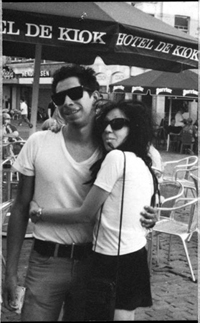 And
the song “The Weather, The War” - my friend Little Annie
played on it. And Little Annie, for those of you who are really
uninformed, is someone who’s been around just as long as I’ve
been, and although critically and cult-ally loved, pretty unsung
in the history books – a real super-talented poet and singer
and really individual style and voice. A really good friend of ours,
I met her on a European tour with Congo Norvell when she was the
support act and she toured with us and we became like brother and
sister immediately. And she, to me, is one of the greatest treasures
and talents. And really she is someone who, though she lived in
Europe for a number of years, she’s someone who’s really
representative of New York. She is very New York. She’s a
Yonkers girl and she really is street – a from-the-street
girl - and a really talented artist. She did stuff with everyone
from Crass to Coil to Wolfgang Press and her own solo records with
Adrian Sherwood and On-U Sound. So she has a really colorful, really
diverse thing. And I feel a real kinship with her. And she’s
perfectly in-tune with what we do. We have incredible parallel lives.
And that song, “The Weather, The War,” another break-up
of a relationship song, such a good subject, the end of love, my
favorite subject - my least favorite experience, but my favorite
subject to write about. And I actually gave her the lyrics to the
song and said, “Do you want to sing on it?” And she
came up with a complete answer to the thing – to my set of
lyrics and made a really incredible duet – a super –post-9/11,
everything’s falling apart. I was pleased to have her.
And
the song “The Weather, The War” - my friend Little Annie
played on it. And Little Annie, for those of you who are really
uninformed, is someone who’s been around just as long as I’ve
been, and although critically and cult-ally loved, pretty unsung
in the history books – a real super-talented poet and singer
and really individual style and voice. A really good friend of ours,
I met her on a European tour with Congo Norvell when she was the
support act and she toured with us and we became like brother and
sister immediately. And she, to me, is one of the greatest treasures
and talents. And really she is someone who, though she lived in
Europe for a number of years, she’s someone who’s really
representative of New York. She is very New York. She’s a
Yonkers girl and she really is street – a from-the-street
girl - and a really talented artist. She did stuff with everyone
from Crass to Coil to Wolfgang Press and her own solo records with
Adrian Sherwood and On-U Sound. So she has a really colorful, really
diverse thing. And I feel a real kinship with her. And she’s
perfectly in-tune with what we do. We have incredible parallel lives.
And that song, “The Weather, The War,” another break-up
of a relationship song, such a good subject, the end of love, my
favorite subject - my least favorite experience, but my favorite
subject to write about. And I actually gave her the lyrics to the
song and said, “Do you want to sing on it?” And she
came up with a complete answer to the thing – to my set of
lyrics and made a really incredible duet – a super –post-9/11,
everything’s falling apart. I was pleased to have her.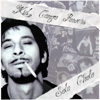 So
the Solo Cholo album is a lot of songs I wrote –
a compilation of stuff I’ve done through the years that feature
me as the singer and the main songwriter. And it has tracks with
everything from Die Haut to Khan to Congo Norvell and the newly
rediscovered treasure of the Fur Bible. And that will be out early
in the year sometime.
So
the Solo Cholo album is a lot of songs I wrote –
a compilation of stuff I’ve done through the years that feature
me as the singer and the main songwriter. And it has tracks with
everything from Die Haut to Khan to Congo Norvell and the newly
rediscovered treasure of the Fur Bible. And that will be out early
in the year sometime.